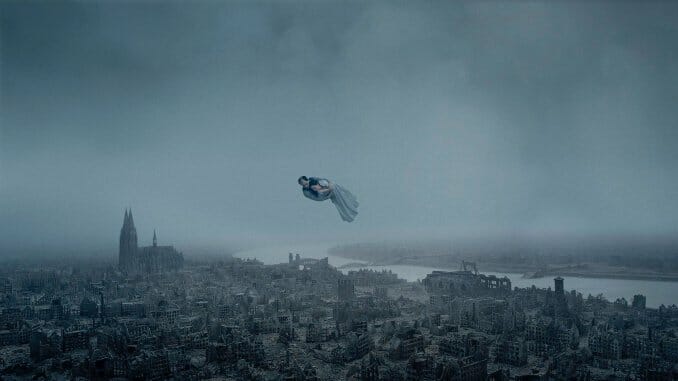Master Filmmaker Roy Andersson Drops the Deadpan for His Poignant, Powerful About Endlessness

What’s confusing at first about Roy Andersson’s latest is that it’s not very funny. Known for his wry deadpan—he’s a master at crafting absurdist humor out of seemingly banal situations—the acclaimed Swedish writer-director, who turned 78 last month, is noticeably in a far less jocular mood for About Endlessness. You can find stray chuckles in this slim, quietly moving treatise on the utter futility of everything, but the laughs are overshadowed by the somber realization that Andersson’s typically bereft characters are left to their own devices even more so than usual. Rather than punchlines, we get glimpses of melancholy lives stuck in limbo.
The Best Direction winner at the 2019 Venice Film Festival, About Endlessness finally arrives in the U.S. carrying far less buzz than Andersson’s previous film, 2014’s A Pigeon Sat on a Branch Reflecting on Existence, which won the top prize at that year’s Venice. In a sense, A Pigeon perfected Andersson’s storytelling trademarks—the static camera, the single-shot tableaux, the sad/funny vignettes—that he’d first introduced in Songs From the Second Floor and You, the Living, and as such felt like both a culmination and a bit of a dead-end. About Endlessness doesn’t appear to be that much different than Andersson’s earlier movies, but its tone is more funereal and compassionate. The people we meet aren’t oddballs or objects of derision—they’re struggling too much to be merely “quirky,” and Andersson’s heart goes out to them, even if he doesn’t give them a happy ending. (Truth is, most of them don’t get an ending at all.) If before you marveled at his tightly choreographed dioramas, here you look beyond the stellar precision of his filmmaking. The human beings are front and center.
As usual, there isn’t much of a through-line to About Endlessness as we drop in on several individuals over the course of the film’s 70-minute running time. A few of them will pop up again later in the movie, but for the most part we get in and get out, gaining only a snippet of information about their lives. We meet a dentist (Thore Flygel) who, for unknown reasons, is having a bad day. A pair of lovers (Tatiana Delaunay and Anders Hellström) fly silently over a bombed-out city, wrapped in an embrace that’s more protective than warmly romantic. A priest (Martin Serner) has dreams of being crucified. A woman gets off a train, expecting that no one will be there to pick her up. A defeated army trudges through the snow to a prison camp. A man holds a dead, bloodied woman, a knife in his hand. Did he kill her or just stumble upon the crime?
About Endlessness works best when it hits us with arresting scene openers, leaving us to ponder precisely what’s going on. (You’ll spend days puzzling out the details from an enigmatic sequence involving a group of young women breaking into dance while unsmiling villagers take in their frivolity.) Not all of these scenes have dialogue—sometimes, only an offscreen narrator (Jessica Louthander) says a few words—and because the scenarios are rarely comedic, the stillness of Andersson’s immaculate framing communicates the characters’ solitude and despair. These people aren’t just trapped in the filmmaker’s sets and his deep-focus photography—they’re entombed in their own silent misery. Andersson shows his actors from head to toe and, because they’re at a distance, the everyday people they play always feel a bit diminished and powerless. There’s no escape for anyone in About Endlessness—including, in one fascinatingly ambivalent scene, Hitler in his bunker as his world comes almost literally crashing down on him.
It’s not surprising for Andersson to juxtapose the lighthearted with the dark, and About Endlessness carries on that tradition: Beyond that dead woman, the priest’s nightmares and Hitler, the film also features a shockingly undefined scene between feuding sweethearts that leads to violence. But because Andersson eschews his patented pokerfaced humor, About Endlessness doesn’t provide the usual tonal relief. In that way, we’re as trapped as his characters, forced to accept the daily disappointments and nagging uncertainty that define existence.
This might make About Endlessness sound like a joyless bummer, and yet what’s remarkable is how it produces its own curious form of exhilaration. Partly, it’s due to Andersson’s rigorous filmmaking style, which presents us with these gorgeous little jewel boxes as each mini-portrait plays out in front of his locked-down camera. But also, it’s the inventiveness of the scenarios: Andersson cuts to the core of myriad mundane human experiences in order to find something resonant about, say, an overattentive waiter or a random run-in with an old classmate. The observations are so trenchant that they keep sadness at bay. Yes, we are these people. Their problems are our problems. But they’re still alive, and so are we. Sometimes, we don’t need the patina of humor. We’re strong enough to accept Andersson’s unhappy worldview unfiltered. It’s a slow-burn stunner.
Director: Roy Andersson
Writer: Roy Andersson
Starring: Martin Serner, Jessica Louthander, Tatiana Delaunay, Anders Hellström, Jan Eje Ferling, Bengt Bergius, Thore Flygel
Release Date: April 30, 2021 (theatrical and on-demand)
Tim Grierson is the vice president of the Los Angeles Film Critics Association and the author of seven books, including his latest, “This Is How You Make a Movie.”
 Keep scrolling for more great stories.
Keep scrolling for more great stories.
